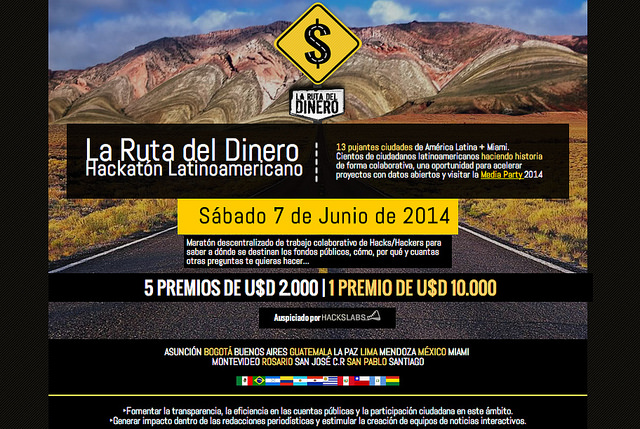
Miami hackathon traces money from World Cup, Venezuela and Miami-Dade dispensaries
Photo: Money-trailing hackathon promo. Credit: Carolina Wilson.
A 10-cent hike in bus and subway fares spurred violent protests in Brazil last June when the country hosted the 2013 Confederations Cup. Since then, the demonstrations have left people wondering about the effects of Brazil hosting the World Cup this summer.
That concern inspired Florida International University Prof. Susan Jacobson to lead a group analyzing Brazil’s World Cup expenditures during Hacks/Hackers “La Ruta del Dinero” Hackatón Latinoameriano (Pan Latin “Money Trailing” Hackathon). That work was one of three projects that emerged from the event at Univision last Saturday.
Miami, the only U.S. city participating, joined 13 Latin American cities in a civic journalism hackathon to track the flow of money from Latin American governments and corporations.
Dan Grech, a journalist and co-founder of the Miami chapter of Hacks/Hackers, “a global mashup of journalists, coders, developers and designers,” led the Miami participants.
“What’s so cool about this event is that it’s all about south/south collaboration and we here in Miami … are really in a support role helping out in whatever way we can,” Grech said. “We recognize that the flow of money is inevitably transnational and flows through our border.”
As the hackers dined on doughnuts and pizza courtesy of Knight Foundation support, several project ideas emerged.
Jacobson contributed her data analysis skills to her team’s World Cup project.
“We wanted to go and see what the government was spending the money on and if there was some way that we could correlate this to social unrest,” she said
At first, the lack of data challenged Jacobson’s group, but the team collected data from different sources to construct a graph demonstrating how much money each government sector has spent and how.
“We’re looking at ports, airports, urban mobility and stadiums,” Jacobson said. “It would also be interesting to compare this data with that of previous World Cups.”
As Jacobson analyzed data from Brazilian money, David Dorr’s team sought a link between money from the Venezuelan government and Miami real estate. Dorr is an international investment manager and executive director of the not-for-profit Luz para Venezuela (Light for Venezuela).
“I think tracking corrupt money is a very, very important subject that doesn’t get enough attention or enough creative minds collaborating to figure out what’s going on, how it’s going on and how to expose that,” Dorr said.
Dorr believes that real estate has become a target for laundering money from criminal enterprise because of lax laws in the United States.
“We are taking a country like Venezuela, where corruption is extraordinarily high, and designing a mini case study of the tie between Latin America and our own backyard,” Dorr said. “We’re asking if it’s possible to actually validate that corrupt capital flows and stolen money out of Venezuela are arriving here in Miami, in real estate particularly.”
Joseph Treaster, the editor of miamiplanet.org, brought a journalistic perspective to Dorr’s team. Treaster, who also is the John S. and James L. Knight Chair in Cross-Cultural Communication at the University of Miami, said that although his team didn’t complete a product, an eventual goal would be to expand the project to study money flows from other countries.
“We just got our claws going, but we didn’t get to the bottom of what we were supposed to do,” Treaster said. “We named our project ‘Real Estate Tracker.’ Once you find a target official in the Venezuelan government, the idea is to study that person from a real estate base, and find out how many real estate transactions they took part in here in Miami.”
Another team, Lazaro Gamio and Alfonso Guerra, studied Miami-Dade County dispensaries.
Gamio, a data producer for the Miami Herald, shared that while the disbursements are available for public viewing, the county is using an old system that makes interpreting the data difficult. Gamio’s team spent hours scraping the data off the website, eventually writing code to retrieve the pages automatically.
“Once we get the data, we can do anything with it on a webpage,” Gamio said. “I’m planning on using D3, which is a digitalization library, to map out what day the county spent the most money on, for example.”
Guerra, a mobile apps entrepreneur, said that eventually one could link the dispensaries’ data set to the Florida Division of Corporations.
“You can see if any of the officers are related to the commissioner or some government employee and start to track and find out if there are nefarious activities going on,” Guerra said.
A giant project screen in Univision’s boardroom was a perfect place for Guerra and Gamio to showcase over 5,000 spreadsheet cells of their manipulated data. Grech looked on with admiration as the day’s projects materialized.
“This points us in a fantastic new direction of how we can build on this concept,” Grech said, “helping Latin American journalists and technologists work together more effectively.”
Carolina Wilson is an editorial intern at Knight Foundation.
Recent Content
-
Communitiesarticle ·
-
Communitiesarticle ·
-
Communitiesarticle ·


